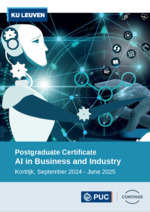Programme structure:
First semester (Sept-Dec): focus on AI foundations
- Fundamentals of Artificial Intelligence (5 ECTS)
- Machine Learning and Inductive Inference (4 ECTS)
- Artificial Neural Networks and Deep Learning (4 ECTS)
Second semester (Jan-June): focus on Business & Industry
- Computer Vision and Natural Language Processing (6 ECTS)
- Business Analytics (6 ECTS)
The programme starts with the theoretical AI foundations that are indispensable for professionals. Participants therefore get 3 academic courses that teach them the scientific basics of artificial intelligence. In addition, the door is opened to industrial applications and general business applications with the courses in the second semester.
“Fundamentals of AI”
In this course, you will acquire a deep knowledge and insight into foundational techniques from Artificial Intelligence, including search methods and their applications to games, the version spaces algorithm for machine learning, constraint processing techniques, strips planning and theorem proving for first-order predicate logic. You will be able to simulate each of the above techniques with pen and paper on small new examples and have insight into the relevance of these techniques for applications in domains such as manufacturing, health, education, logistics, manufacturing, and robotics.
“Machine Learning and Inductive Inference”
This course will familiarize you with the domain of machine learning, which concerns techniques to build software that can learn how to perform a certain task (or improve its performance on it) by studying examples of how it has been accomplished previously, and in a broader sense the discovery of knowledge from observations (inductive inference).
After following this course, you will
- have a basic understanding of the general principles of learning
- have an overview of the existing techniques for machine learning and data mining
- understand how these techniques work, and why they work
- be able to implement programs that learn or exhibit adaptive behavior, using these techniques
- be up-to-date with the current state of the art in machine learning research
- be able to contribute to contemporary machine learning research
“Artificial Neural Networks and Deep Learning”
The course aims to introduce the basic techniques, methods and properties of ANN and to study their application to selected problems. The basic concepts will be introduced in the lectures. Advanced topics and recent research results will be touched upon occasionally. You will study and develop explicit neural network models for selected applications.
“Computer Vision and Natural Language Processing”
The course introduces natural language processing technologies and their applications in a variety of tasks, which include text mining, machine translation, question answering and dialogue modelling. It also introduces computer vision algorithms and their applications such as image classification, object detection, and image segmentation. Special attention goes to applications that require the joint processing of language and visual data, as this is a natural way to interact with machines.
The students will gain insights into suitable machine learning algorithms that ideally are trained with limited annotated examples or human feedback. They will learn how to build and critically assess an application making use of the most recent techniques and resources.
“Business Analytics”
In this course, you will learn to understand how business problems can be formulated with advanced analytics techniques as a potential solution. You will be able to reason on the organizational and managerial aspects of applying big data and analytics techniques and understand how prescriptive analytics and causal ML can help to use analytics for business decision-making. The course teaches you how analytical modelling techniques can be optimized and evaluated from a profit-driven perspective and how analytics techniques can exploit network-based information.
After following “Business Analytics”, you will know how to deal with unstructured data in the form of textual inputs, and how to use such data for practical business applications such as sentiment analysis or social media analytics. The course deals with how state-of-the-art explainability techniques can give insights into black-box machine learning models and how process mining techniques can be applied to data sets originating from process-aware information systems, including automated process discovery, conformance checking and extension. Upon completion of the course, you know which data science tools and environments are important for realizing applications of machine learning in business, including platforms such as Hadoop, Spark, etc, which business applications might benefit from deep learning techniques, and how to apply them and evaluate their appropriateness.






